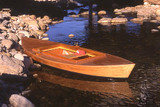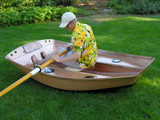MAXI MAC RIVER BOAT PLANS INSTANT DOWNLOAD
This is an instant download. You will receive a link as soon as you complete the order.
In you prefer printed plans, click HERE
a cartopper if you don't want the hassle of a trailer
The Maxi Mac is a slightly enlarged version of the solo Mini Mac drift boat. The Max boat is only 18 inches longer than the Mini but the increased width and depth of the Max provide almost double the volume of the Mini and at 125 pounds for the lightweight version its still a cartopper if you don't want the hassle of a trailer. The increased size of the Max boat provides a considerable safety feature in rough water, and it will handle up to three adults with gear. The Max is our most popular boat.
The center console feature provides structural support to the clean open hull, adjustable seating, storage and flotation compartments, and is also an ideal location for a motor well. Traditional drift boat seating may also be installed over the console, and the seats can be made removable for the best of both layouts.
A motor well in the console locates a small motor safely and efficiently inside the hull with easy access to motor controls, and even the smallest of gas or electric motors will push the slippery hull. A motorized version provides the ability to launch at the "put-in", repeatedly motor upstream and drift back down, without the need for a shuttle vehicle at a separate "take-out" location.
Various interior layouts are possible. The boat can be set up for a guide and client layout with aft rowing station and room forward to stand for casting, or with midships rowing station and seating on fore and aft compartments. Or the center console can be equipped with adjustable seating for changing situations. Some Max builders have installed thicker topsides and structural seating instead of compartments, and whitewater versions have completely compartmentalized interiors with self-bailing footwells.
The Max building plans include a 40 page spiral bound manual of photos, sketches, sources, step-by-step, builders tips, plus in-depth discussion of options and modifications to customize the basic boat, all written for amateurs and first-timers.
The Max boat is about 14 feet LOA with a beam at the chine of 4 feet and a topside beam of approximately 62 inches. The measurements are approximate because this construction technique allows a degree of flexibility to the builder and the finished boats always seem to come out slightly different. The overall beam, as well as the LOA, may be a couple of inches more or less because of the way in which different types and thicknesses of plywood bend, the manner in which gunnel strips are laminated either as an inwale on the inside of the gunnel or as an outwale on the outside, and thickness of strips of different species which will make the required bend without breaking. Length overall can also be modified a few inches by building slightly more rocker into the bottom or keeping it flatter. A flatter run on the bottom translates to an easier rowing hull and more efficient motoring, while more rocker makes a hull easier to spin in the water and may perform slightly better in moderate white water. The ply/epoxy construction technique, once the hull panels are laced together and before fillets or bulkheads are installed, allows the builder to force slightly more or less rocker into the hull by adjusting small spacer blocks under the fore and aft ends of the bottom. Adding more than a couple inches of rocker to the otherwise almost flat bottom may also require refitting slightly wider bulkheads to compensate for slightly more beam so the decision is usually based on how the boat will be used.
Builder Comments and Photos
**********

click the image above for more from Mike
**********
Paul,
I can't tell you how excited I am right now to have found your site! I have placed several calls, e-mails and faxes to Outdoor life trying to find you. All I had to do was type in "Outdoor life river boat plans" into Google and there you are.
I remember some 14 odd years ago reading plans on building your river boat.
I didn't have the time nor money then to do it. But I do now! Not to mention last years week long trip down the Green.
I need a set of your Maxi-Mac plans. Do you take credit card? If not let me know how I can get them.
Thank you sir, Eric Scott
**********
Hi Paul....Just wanted to send an update on the Max boat I'm building. It's nearing completion and since taking the photos I have completed the forward and aft decks and installed hatches per your instructions, and a small motorwell in the centre console to take an electric trolling motor. I have loved building this boat (being the first boat I have built), and I know that this will only be the first of many. I will send photos of the finished product in the next few weeks when I get her out on the water.
For the Max boat, I found that I could source structural grade 4mm hardwood ply for about $21 per sheet. It has a higher strength rating that normal exterior hardwood ply, the same waterproof glue, but is not as pretty (I really had to sift through to find sheets with even just one side good enough to varnish). I am already considering the next boat project (even before the max has seen water...), but I think it will be someting bigger. Possibly something capable of coastal cruising, not sure yet, but these things take time to think about (and certain people need convincing before I am allowed start!). Anyway, I will send through some photos of the max once she is finished and afloat within the next week or two...
Regards, Steve. Bega, NSW, Australia


click the image above for more from Steve
**********
Dear Editor,
Thanks for the Do-It-Yourself of FEB/MAR 2002. Outdoor Life has provided me recreational mental field excursions while wintering over in the Balkans.
Just wanted to say that I am jazzed to get home from Kosovo and build the Maxi-Mac drift boat with my children. It has been built several times in my mind and look forward to trading in the bandages and Intravenous (IV) fluid bags for the jigsaw and varnish. I am ordering the plans to be sent to my home in Richmond Hill , GA; where they will be waiting for me and my first long weekend.
Bruce A. Slack, MAJ
OIC Emergency Medical Treatment Section Task Force Med Falcon V Camp
Bondsteel, Kosovo
**********

click the image above for more from Larry
**********
Paul...
here's a picture of the finished Max boat. My brother and I built the boat, with help from my wife Karen and the kids Jonathan, Bradley and Michelle. We were very pleased with the plans. thanks.
Mike Budworth
Wisconsin

**********
Hi Paul,
Thanks for such a quick response to my email on Friday. I figured it would take a number of days for you to get back to me. As soon as I saw the center seat down the middle of the Max boat, it seemed the most logical location I have ever seen. I will be ordering a set of plans next week (waiting for payday).
Thanks for your time.
Jay Zott
California
**********
Dear Paul....I hope you like this picture as much as I liked building the boat. It has already yielded me access to many good spots and many trout. I am still making modifications including knee locks for standing. I'm happy with the seats including the side consoles, which were a shot in the dark but they work well. I get a lot of positive comments and inquiries about the boat. There aren't that many home-built boats in the Atlanta area and people don't know what they're missing.
Thanks again for all your help during the entire process. The project was fun, easy and hopefully just the beginning. By the way, while researching in my local library I found "Plywood Projects" by none other than Paul Butler. The rowing dory is similar to the Maxi-Mac, and I am happy to have bypassed the frame and ladder method and built a stitch and glue boat.
Jerry Crane. Georgia

**********
This version was built with lightweight the first priority. It has 4 mil BS1088 okoume ply topsides, all sealed with epoxy, and all trim wood is selected air-dried sitka spruce. Overall hull weight--before paint and varnish--was 98 pounds. After finishing, the boat weighed just over 100 pounds. Lightweight allows a larger payload, but the real advantage is realized getting the boat in and out of the water. In the water the hull can be ballasted, if necessary, to suit conditions. This boat was cartopped, and with the tough, slick, graphite bottom it can be dragged everywhere, over parking lots, launch ramps, and across gravel beaches, like a sled.




















